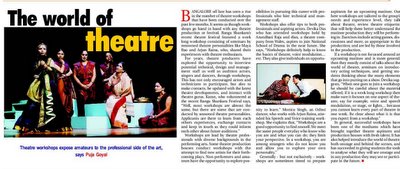The world of Theatre
 Source: Vijay Times, Life- Pg 3.
Source: Vijay Times, Life- Pg 3.Copyright © 2005 Puja Goyal.
Bangalore off late has seen a rise in the number of theatre workshops that have been conducted over the past few months. It seems as though workshops go hand in hand with any theatre production or festival. RangaShankara's recent theatre festival featured a week long workshop consisting of seminars by renowned theatre personalities like Maya Rao and Arjun Raina who shared their experiences with theatre enthusiasts.
For years theatre producers have explored the opportunity to interview potential technical, design and management staff as well as audition actors, singers and dancers through workshops. This has not only encouraged actors and technicians to participate but also to make contacts, be updated with the latest theatre developments, and interact with theatre gurus. Karan, who volunteered at the recent RangaShankara Festival says, "Well, most workshops are almost the same, but there are some that are conducted by seasoned theatre personalities. Applicants are there to learn from each others experiences, exchange contacts and keep in touch so they could inform each other about future auditions".
Workshops are lead by theatre professionals with diverse backgrounds in the performing arts. Some theatre production houses conduct workshops with the attempt to find new artists for their forthcoming plays. Non-performers and amateurs have the opportunity to explore possibilities in pursuing this career with professionals who hire technical and management staff through this process.
Workshops also offer tips to both professionals and aspiring actors. Devika Das who has attended workshops held by Arundhati Raja and élan a theatre company from Wales, aspires to join National School of Drama in the near future. She says "Workshops definitely help to know the basics of theatre, voice modulation… etc. they also give individuals opportunity to learn." Monica Singh, an Odissi Dancer, who works with Arjun Raina, attended his Speech and Voice training workshop, she explains that, "Workshops are a good opportunity to find oneself. We meet the same people everyday who knows who you are and what you can do; they limit your perspective. In a workshop you are among strangers who do not know you and allow you to explore your own personality."
Generally - but not exclusively - workshops are sometimes timed to prepare aspirants for an upcoming matinee. Out here workshops are tailored to the group's needs and experience level, they talk about theater, review theater etiquette, and ask aspirants to participate in exercises that will help them better understand the matinee production they will be performing in. Exercises include acting games, discussions, journaling and more, as appropriate to the production; and are led by those involved in the production.
If a workshop is not focused around an upcoming matinee and is more general, then they mostly consist of talks about the world of theater, seminars on introductory acting techniques, and getting students thinking about the many elements that go into putting on a show. Devika suggests, "When one goes to join a workshop, he should be careful about the material offered; if it is a week long workshop then make sure it focuses on one aspect of theatre, say for example, voice and speech modulation, or stage, or lights… because you cannot learn every part of theatre in one week. Be clear about what it is that you expect from a workshop."
In general successful workshops have been one of the mediums which have brought together theatre aspirants and production houses with fresh talent. It has also helped introduce the world of theater, both onstage and behind the scenes, and has succeeded in giving students the tools to analyze what they will see onstage and in any production they may see or participate in, in the future.
Comments